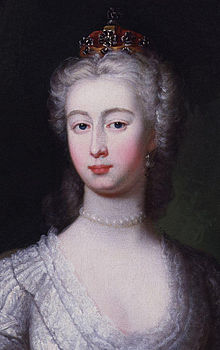
Sing Unto God (also known as the Anthem for the Wedding of Frederick, Prince of Wales and Princess Augusta of Saxe-Gotha) ( HWV 263), is an anthem composed by George Frideric Handel. It was performed for the royal wedding on 27 April 1736 at the Chapel Royal in St James's Palace, London with Francesca Cuzzoni-Sandoni, Carlo Broschi "Farinelli", and Francesco Bernardi "Senesino". The text was adapted from verses of Psalms 68, 106 and 128. [1]
Background
The wedding of the twenty-nine-year-old heir to the throne, Frederick Prince of Wales to the seventeen-year-old Princess of Saxe-Gotha, who had arrived in England only two days earlier, was celebrated with great pomp. The press reported on the rehearsal of Handel's anthem:
Yesterday there was a Practice of a fine Anthem compos'd by Mr. Handel, to be performed at the Nuptials of the Prince of Wales, at Mr Gates's, Master of the Boys belonging to the Chapel Royal, St. James's; the Vocal Parts were perform'd by Mess. Row, Gates, Lee, Abbot, Beard, the Gentlemen of the Chapel, and the Boys. The Instrumental Parts by twenty of His Majesty's Band of Musick, and the same number of performers from Mr. Handel's opera. [2]
The words of the anthem were published in the newspapers. The only comment on the music from someone who was present at the wedding that is known is from the diary of the Earl of Egmont: "Over the altar was placed the organ, and a gallery made for the musicians. An anthem composed for the occasion by Mr. Hendel was wretchedly sung..." [2]
Text and structure


(Alto Soloist, Full Chorus, Orchestra including timpani and solo trumpeter)
- Sing unto God, ye Kingdoms of the Earth
- O sing Praises unto the Lord.
(Soprano soloist, orchestra)
- Blessed are all they that fear the Lord:
- O well is thee, and happy shalt thou be.
(Bass soloist, obbligato cello and orchestra)
- Thy wife shall be as the fruitful vine
- Upon the walls of thine house
- Thy children like the olive branches
- Round about thy table.
( Fugal chorus with orchestra)
- Lo, thus shall the man be blessed
- That feareth the Lord
- Blessed shall he be
- He shall be blessed.
(Tenor soloist, recitative with continuo instruments)
- Blessed be the Lord God of Israel
- From everlasting to everlasting.
(Tenor soloist, full chorus, orchestra including timpani and solo trumpeter)
- And let all the people say
- Hallelujah, amen.
- Blessed be the lord, Hallelujah, amen.
- Praise ye the Lord, Hallelujah, amen.
- Blessed be the Lord
- From everlasting to everlasting.
- Amen, Hallelujah, amen. [1]
Recording
Gillian Fisher (soprano), James Bowman (countertenor), John Mark Ainsley(tenor), Michael George (bass), New College Choir Oxford, The King's Consort, Robert King (conductor). Hyperion Records CDA66315. Released 1989.
References
- ^ a b King, Robert. "Program notes for "Music for Royal Occasions'" (PDF). Hyperion Records. Retrieved 20 September 2013.
- ^ a b Burrows, Donald (2008). Handel and the English Chapel Royal (Oxford Studies in British Church Music. Oxford University Press, USA. ISBN 978-0199550968.
External links
Includes "Sing Unto God" HWV 263: Scores at the International Music Score Library Project